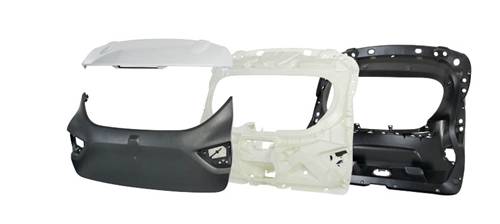Styron (Berwyn, PA) has unveiled what it describes as the first entirely thermoplastic, mono-material lift-gate ever produced in series on a vehicle featured in the New Renault Clio; the three components that comprise the lift-gate are based on polypropylene (PP).
October 3, 2012
Styron (Berwyn, PA) has unveiled what it describes as the first entirely thermoplastic, mono-material lift-gate ever produced in series on a vehicle featured in the New Renault Clio; the three components that comprise the lift-gate are based on polypropylene (PP).
The inner skin is injection molded using a talc filled polypropylene compound from Styron and connects to the structural part. The structural part is produced with long glass fiber polypropylene resin (LGF-PP) concentrate developed by Styron. This concentrate is diluted directly on the molding machine with appropriate PP copolymer resin through dry-blend directly. The outer skin is made with Styron's Inspire At-Press talc masterbatch concept, which injection molds through blending of the different components (polypropylene impact copolymer, specifically designed 70% talc masterbatch and the required color concentrate), allowing for a tailored mechanical performance to meet the OEM specific application requirements.
Berend Hoek, Application Engineering & Development Styron Automotive says: "Renault had initially approached us to support them with the concept development of the new lift-gate. They had seen our engineering capabilities at work for the structure development for the front end carrier of the VW Golf using LGF-PP. This exterior application was confronted with similar complexity issues in design as well as production process: it consisted of different metal and thermoplastic parts that had to be assembled into a single application."
"The automotive industry has been looking for alternatives to steel for lift-gates for many years. Weight savings, styling freedom and function integration are the main objectives," says Marjolein Groeneweg, Marketing Manager Styron Automotive. "With this innovative concept jointly developed by Renault and our R&D department, the French car manufacturer not only contributes to weight reduction for optimal fuel efficiency but also responds to waste management recycling guidelines promoting recyclability without disassembly. Knowing that the base polymer of the lift-gate solution is the same, the part can be easily recycled and used in other future applications." The new lift-gate is 10% lighter than a conventional one.
A lift-gate is a complex application for several reasons: It needs to fit perfectly on to the car and has numerous functions that need to be hidden (such as the hinges and the closing mechanism). Additionally, it is subjected to many external conditions such as exposure to high/low temperature in humid environments that can cause deformation issues and must then be addressed to guarantee water tightness. To help improve impact resistance, expansion and durability of the structural part of the lift-gate, Styron's engineers introduced LGF-PP to meet such requirements. By increasing the glass content of the molding material, the part is able to gain improved stiffness and toughness. The selected materials were tested and fine-tuned to Renault's specific production process including injection molding, painting, bonding and welding.
In addition, Styron also supported Renault in optimizing the tool-design for their machine and specifically supported them with selecting the appropriate plasticizing screw to maintain the required fiber length after molding the lift-gate. Choosing a material composition and manufacturing process that achieves the desired glass fiber length distribution is critical to meeting the specific performance requirements of Renault's lift-gate.-[email protected]
| |
The three parts that form the New Clio's lift-gate made from Inspire PP compounds plus the spoiler made from Magnum ABS |
About the Author(s)
You May Also Like



